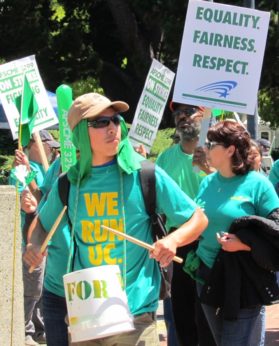
BERKELEY, Calif.—After more than a year of unsuccessful bargaining with the University of California, AFSCME Local 3299—representing some 9,000 service workers performing vital functions at all 10 UC campuses—launched a three-day strike throughout the university system May 7-9.
The strikers, including food service and security workers, custodians, and gardeners, were joined in sympathy strikes by over 15,000 patient care workers also represented by AFSCME 3299, and by the California Nurses Association, representing 14,000 UC nurses, and the University Professional and Technical Employees (UPTE), representing another 15,000 UC workers. Overall employment in the university system totals more than 223,000.
Late last month, the university announced it would unilaterally impose higher health care premiums, a higher retirement age for new workers choosing a pension rather than a 401(k), more outsourcing of jobs, and a 3 percent annual wage increase the union said was far from matching rising living costs.
Following UC’s announcement, the union said, the strike vote was 97 percent.
The union is calling for a 6 percent annual pay increase, no higher cost for health coverage, and full pension benefits at age 60.
Also energizing the strikers and their supporters is a recent study conducted by Local 3299 showing starting wages of black and Latino workers to be about 20 percent lower than those of their white counterparts.
Although the university said many surgeries and medical appointments were postponed because of the strike, the unions emphasized that a Patient Protection Task Force of striking health care workers had been formed and was ready to respond to requests for emergency patient care help.
At a noontime rally on the UC Berkeley campus May 7, most pickets sported bright green shirts bearing the slogan, “We Run UC!”
Local 3299 President Kathryn Lybarger pointed out that Local 3299 is “the largest union of the third largest employer in the world’s fifth largest economy.”
Recalling many times over the decades when the union “has pushed the university, kicking and screaming, to do the right thing,” Lybarger said, “Many students and community members are drawing a line in the sand once again, they will not outsource our jobs, they will not impoverish the people who do the work here. We are holding the line on the last, best middle-class jobs here in California.”
Union and community solidarity was evident in the crowd, as well as among the rally speakers.
Alameda Labor Council Executive Secretary-Treasurer Josie Camacho vowed the support of the county’s 135,000 union members: “We will stand with you, fight with you, and we will not go away, University, until justice is served.”
Those sentiments were amplified by California Labor Federation head Art Pulaski, who pledged the backing of the state’s two million union workers. When the University of California claims to be “building a better future,” he said, “they should practice what they preach.

“You can’t build a better future by withholding wages, especially of the lowest-paid workers. Or when you force up the cost of health care to your workers, especially your low-wage workers. You cannot build a better future when you contract out the work of your low-wage workers and pay even lower wages to contract workers.”
Speakers from other unions joined in expressing their solidarity, among them the Berkeley Federation of Teachers, SEIU Local 1021 which represents workers in local governments around northern California, and SEIU United Service Workers West.
Michael Burawoy, a sociology professor who chairs the Berkeley Faculty Association, told the workers his organization “enthusiastically supports your strike. We all know the university is being especially miserly in its bargaining with you, and at the same time is feathering its own nest.”
Burawoy said administrators’ salaries have gone up by 64 percent in the last decade, and on the Berkeley campus, the ratio of top earners’ income to lowest income is 20 to 1.
“A strike is important for many reasons: a show of strength, to broadcast the plight of workers, to focus struggles,” he said. “But it also serves to remind the campus of your importance, of how dependent we are on you … Nobel Prize winners get all the glory, but there will be no Nobel Prize winners if there are no service workers. You do the invisible work of Nobel Prize winning. You are ALL Nobel Prize winners!”
Support is also coming from political leaders around the state. Responding to the union’s call, U.S. Senator Kamala Harris, D-Calif., announced May 7 that she would not speak at UC Berkeley’s commencement.
And two dozen state legislators led by Assembly Appropriations Committee chair Lorena Gonzalez, D-San Diego, sent a letter to university administration late last week, emphasizing that continued inequities at the university would have a negative effect on wages of other California workers. “As the largest employer in California, and the recipient of more than $3 billion in taxpayer dollars, the University of California has a responsibility to lift up all boats,” Gonzalez said.










